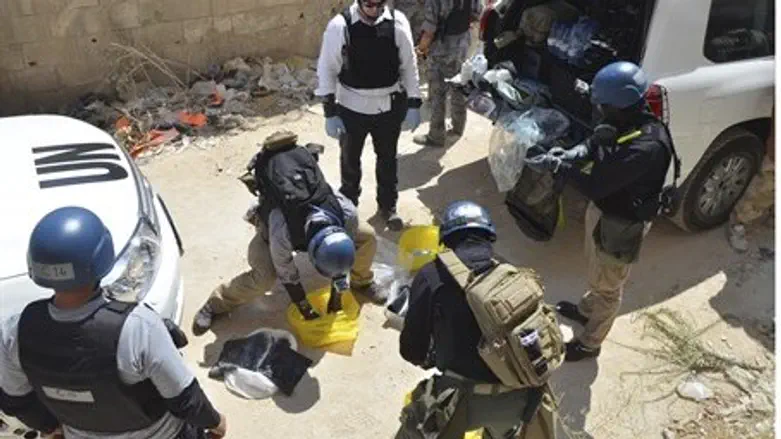
Syria's declared chemical weapons arsenal has been completely destroyed, capping more than two years of work, a global arms watchdog said Tuesday.
The declaration, however, came a day after it was announced that a fact-finding mission by the UN chemical weapons watchdog found that some people in Syria may have been exposed to sarin or a sarin-like gas.
The Organization for the Prohibition of Chemical Weapons (OPCW), which oversaw the dangerous removal and elimination of Syria's avowed stockpile, has for months been warning of the continued use of mustard, sarin and chlorine gas in the brutal conflict.
But it has avoided blaming either the regime of Syrian President Bashar Al-Assad, the rebels or the Islamic State (ISIS) group for the use of the weapons banned under international law.
After years of denials, the regime caved to international pressure in September 2013 and agreed under a United States-Russia deal to hand over its toxic stockpile to the OPCW for destruction.
The admission came after a sarin gas attack in August that year on rebel-held areas near Damascus that was blamed by the West and the opposition on the regime. Hundreds of civilians were killed.
The removal of the weapons was the result of a historic deal which averted threatened US air strikes against Damascus after the August attacks.
"One hundred percent has been destroyed," Malik Ellahi, the OPCW spokesman, told AFP on Tuesday.
With the UN Security Council poised to discuss the chemical weapons issue, OPCW director general Ahmet Uzumcu said: "This process closes an important chapter in the elimination of Syria's chemical weapon program."
But he acknowledged the organization based in The Hague was still continuing "efforts to clarify Syria's declaration and address ongoing use of toxic chemicals as weapons in that country."
In a separate report released Monday after being sent to the Security Council last week, the watchdog said it was investigating 11 incidents reported by the Syrian government in which people may have been exposed to sarin or sarin-like gas.
"Further investigation would be necessary to determine when or under what circumstances such exposure might have occurred," the report said.
Previous fact-finding missions by the OPCW in Syria have pointed to theuse of chlorine and mustard gas.
The OPCW had in the past voiced "grave concern" at the continued use of toxic arms in Syria, calling for those behind such attacks to be held accountable.
Both the regime and ISIS have been accused of using chemical weapons in the war, although it remains unclear where the arms have come from.
Syria has denied ever using chemical weapons in the civil war, and it argues that claims otherwise or only meant to " serve political agendas".
Under the terms of the deal hammered out in Geneva in September 2013 by Secretary of State John Kerry and his Russian counterpart Sergei Lavrov, Syria finally admitted to possessing over 1,000 tons of chemical weapons and agreed to hand them over for destruction.
Under the agreement, Syria's entire chemical arsenal had been due to be eliminated by June 30, 2014, and all chemical effluent by December 31, 2014.
But the timetable slipped badly amid protractions by the Assad regime and complications posed by the nearly five-year civil war which has claimed more than 250,000 lives.
The last remaining vestiges of the regime's declared stockpile -- some 75 cylinders of highly-corrosive hydrogen fluoride -- were destroyed by American firm Veolia at its treatment plant Port Arthur in Texas, the OPCW said.
A total of 1,300 metric tons of chemical weapons have now been removed from Syria, with the majority neutralized on the U.S. Navy ship MV Cape Ray and turned into less harmful effluent.
The OPCW's work in Syria saw it being awarded the Nobel Peace Prize in 2013.
AFP contributed to this report.